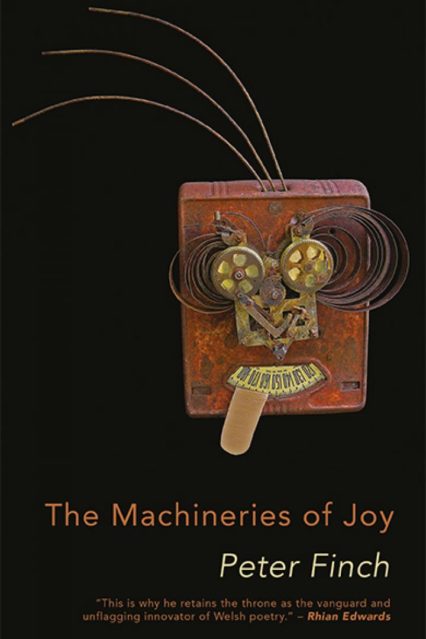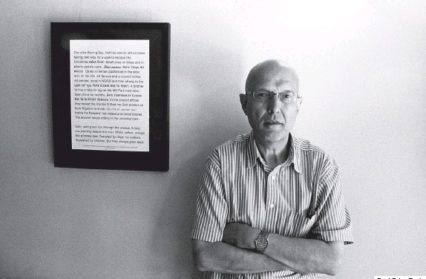Sophie Baggott reviews Cardiff-based writer and performer Peter Finch’s 26th poetry collection, Machineries of Joy.
It was only after I had read all 88 pages, jotted down my notes, and sat at my desk to write this review that a fog lifted: I had met this poet. Years ago, when we were neighbours, Peter Finch had made me a cup of tea. What a small world Wales can be. Though, actually, this is a point of contention. “Bigger than Texas”, Finch writes of Wales in the first line of his first poem (‘Wales’). Ah. Much as I’d like to vouch for my once-upon-a-time neighbour and to ‘big up’ my homeland, we are – at 20,735 km² – far, far smaller than the 695,662 km²-sized state in the US. Is this to say I should take the apparent (post-)truths of this collection with a pinch of salt? Yes. He closes the poem: “Wales, hard to know. | Just when you think you do. | You don’t.”
 Perhaps the only thing you should take at face value is the book’s title: Machineries of Joy. Finch does indeed seem to be having great fun tinkering with the mechanisms of poetry and, let me tell you, it is immensely enjoyable to read. This is Finch’s first poetry collection in a decade, and a reader could easily spend another ten years trying to decipher it all. Cut to page 38, ‘I Have No Idea What The Answer Is’ – but I’m pretty sure it’s a good thing that the questions are being asked.
Perhaps the only thing you should take at face value is the book’s title: Machineries of Joy. Finch does indeed seem to be having great fun tinkering with the mechanisms of poetry and, let me tell you, it is immensely enjoyable to read. This is Finch’s first poetry collection in a decade, and a reader could easily spend another ten years trying to decipher it all. Cut to page 38, ‘I Have No Idea What The Answer Is’ – but I’m pretty sure it’s a good thing that the questions are being asked.
The collection is intrinsically Welsh. There’s no hiding Finch’s obsession with Wales and, more specifically, Cardiff. The city is omnipresent. There’s even a direct nod to the field of psychogeography that often preoccupies the poet (“Last summer in a storm of psychogeography | I brought the bike tour here”, ‘Hendrix Island’). The collision of place and people is an ongoing preoccupation. In one of the early poems, ‘Ty Draw’, Finch wanders into his childhood by Roath Park. He scours it for traces of his younger self – carved initials, marks of damage, “some ghostly motes floating still…” and goes on to ask, “In a life | how much do you have to do to outlive it?” Chasing the past here has turned up nothing. It’s a little melancholy, but Finch ends on a quiet note of optimism: “I’ve written it now. | And you’ve read it. So, something remains.”
The famous Finchian experimentalism is everywhere, of course. From ‘The City Region’ that lists street names in Cardiff, closing with “The Plaza, The Plaza, The Plaza. The Plaza.”, to the liquefying epics in the second half of the book, there isn’t a dull moment. I felt a growing awareness of the inevitability of disintegration – unravelling takes place in the psychological, the physiological and the poetic. There runs a series of poems from page 29 to 36 which addresses this in terms of the mind and body, from mental health to disease to ageing to death itself. It’s not quite as bleak as it sounds.
The collection is also very much of its time. Finch touches on race (“the only blues | on live tonight is white stuff”, ‘Clarksdale’), anxiety (“she gets | panic attacks even bringing in the milk”, ‘The Tree’), gender (“Well, we ain’t got her elected yet, but we’re certainly gonna try”, ‘Vote’), and much much more. Naturally, the poet’s love of music pops up throughout. The titular poem, in fact, imagines Bach trying to flog his music at the end of the Sainsbury’s pet food aisle until the focus shifts to “a bald, bent man” writing:
He knows it is all ultimately pointless
because the kids don’t listen anymore,
if they ever did,
but he doesn’t care.
Is this striking a note somewhat closer to home? There is much self-mockery to be found in Machineries of Joy as well as many barbed comments about the poetry landscape. Both feature heavily in ‘Fish’, but for this I’ll refer you to Carol Rumens’ meticulous review for Poem of the Week.
Finch is a performance poet, and the poetry on these pages is crying out to be read aloud. At a time when gigs and festivals are a no-go, I guess we’ll have to settle for virtual performances. I looked up one or two, and discovered just how much ‘The Psychic Triangle’ is quite the mouthful. I’m holding out for a YouTube rendition of ‘Crow’, one of my favourite poems here, which runs from page 43 to 47 and is the first of many to lapse into breakdown. The poem begins relatively coherently with “is the desert deserted | is the Mojave green | is the radar realistic” and gradually dissolves into matter along the lines of “is sflossfgssssjss sssss ssss sshgs | is ssssjs sss sssskss ssssksss” until we reach the last line: “Peter Fin sh sssssss s o”. This is in contrast with the neat brickwork of ‘Institutions of Wales #1’ several pages later, built with the word “assembly” in 24 rows of five columns. What’s the meaning (if any) of it all?
I could continue with thousands more words on this intriguing collection, but to wrap up I’ll go back to ’I Have No Idea What The Answer Is’. In closing the poem, Finch writes: “Hopeless. Yet somehow | out there in the grey world | things are still going on.” In this surreal moment for society, not even this is wholly true. Who would’ve had any idea just months ago? In any case, the poetry holds some essential wisdom: “Avoid miasma. Do not walk in fog. Avoid worldviews.”, (‘Getting to the Head of the List’).
Ultimately, I took away this: if there can be even the tiniest element joy or surprise found among these often nonsensical times, seize it. And seize this extraordinary book too, while you’re at it.
Machineries of Joy by Peter Finch is published by Seren Books.
Sophie Baggott is a regular contributor to the Wales Arts Review.











